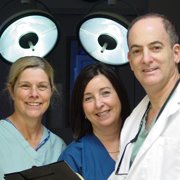Dr. Michael Kreidstein, Plastic Surgeon in Toronto
/Keeping up with Canadian cosmetic surgery trends with Dr. Michael Kreidstein.
Name: Michael Kreidstein, MD, MSc, FRCS(C)
Location: Toronto, Canada
Website: drkreidstein.com
That's interesting: In 2010 he was appointed by the College of Physicians and Surgeons of Ontario (CPSO) to serve as a Physician and Premises Inspector of private surgical clinics for the Out of Hospital Premises Inspection Program. In 2011 he was appointed by the CPSO to serve as a Plastic Surgeon Peer Assessor. He is committed to excellence in Cosmetic and Reconstructive Plastic Surgery.
Can you give us a picture on how your clinic is organized and runs?
In many practices, the surgeon delegates important aspects of patient consultation, education, treatment, and post-op care to others in the practice. We believe that the best source of information for our patients is Dr. Kreidstein, and readily accept that this limits the number of patients that we can serve in our practice.
How has cosmetic medicine in general, and plastic surgery in particular, changed in Canada in the last ten years?
The most important and beneficial change in Ontario has been the authority exercised by the College (CPSO) in preventing MDs from falsely claiming to be plastic surgeons, or practicing surgery in facilities that are unfit.
You're a Physician Premises Inspector of private surgical clinics as well as a Plastic Surgeon Peer Assessor for the College of Physicians and Surgeons of Ontario (CPSO). How do these roles integrate or detract from your private practice?
Working for the College gives me an opportunity to learn from the many practices I assess, and apply some of the good things I see. It focuses our own practice on the need to meet and exceed certain guidelines. Unfortunately, it is also time-consuming and forces me to read a lot of illegible doctor’s notes (ugh!).
You're a member of the American Society for Aesthetic Plastic Surgery (ASAPS). As a plastic surgeon in Toronto, what are the benefits or costs of joining American medical societies as a Canadian physician?
The American Societies attract surgeons internationally, and the journals and meetings provide us an opportunity to learn and deliver the best treatments in the world.
As a Canadian plastic surgeon, is your practice represented by the Canadian Medical Protection Association (CMPA)? What kinds of insurance are required for cosmetic physicians in Canada in private practice?
All Canadian physicians and surgeons are required to carry insurance, so that financial compensation is available to patients in the event of a successful medicolegal action.
What do you think about nonsurgical technologies like Thermage and Fraxel?
I am well versed in these treatments, but do not currently offer them. These devices are proven to consistently help device manufacturers, not so much patients.
What's the best advice you've ever received as a physician?
Establishing my own operating facility has helped me immensely. Patients paying for cosmetic procedures expect nothing but the best, and I could not always offer that in a hospital setting.
During my training as a plastic surgeon, I expressed to a senior surgeon that “I was worried about a patient”. He told me that worrying is unproductive- if there might be a problem, investigate it aggressively and take the necessary steps to fix it, but don’t worry as it doesn’t solve anything. I think that was wise advice.
About: Dr. Michael Kreidstein is a Plastic Surgeon trained at the University of Toronto. He has been in Private Practice for 17 years. His career has included basic science research, clinical research, expert testimony in medical legal and professional regulatory issues, and clinical practice including reconstructive and cosmetic plastic surgery.
This interview is part of a series of interviews of physicians running medical spas, laser clinics and cosmetic surgery centers. If you'd like to be interviewed, just contact us.






